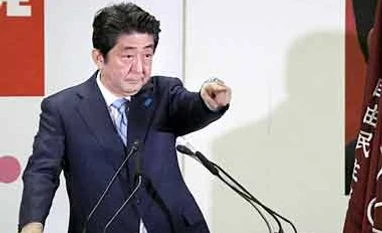For the second time in a year, Japan's economy has slipped into recession, but consumers' taste for upmarket noodles and pricier chocolates suggests some pockets of resilience, and some hope for 'Abenomics', the reflationary policies championed by Prime Minister Shinzo Abe.
Concerned about faltering growth in China and the global outlook, Japanese companies are reluctant to spend their ample cash in capital investment and wages.
But consumers content to pay a bit more for added-value products offer some counter argument to those proclaiming Abenomics' demise.
Nissin Foods Holdings Co Ltd added more meat and toppings to its signature Cup Noodle products earlier this year, and raised prices by 5-8%. Sales rose by a tenth in April-September from a year earlier.
And sales of chocolate bars priced at 250-259 yen ($2.03-$2.10) jumped by more than a third in the year to March compared with two years ago. Sales of chocolate priced at 50-99 yen rose just 1.2%, according to data from an industry body.
"Consumers who pay more for value-added products will underpin private consumption," said Hiroki Shimazu, senior economist at SMBC Nikko Securities.
More From This Section
HIGHER PART-TIME WAGES
Strong gains in part-time wages, caused mainly by a shortage of labour, are another brighter spot helping support the economy.
Part-timers' hourly wages hit record highs for a fourth straight month in September, data from private-sector agency Recruit Jobs showed, with pay rising 1.5% in big cities. Overall wage growth has remained subdued at around 0.6%.
Companies in the service sector, which rely more on part time work, say that upward trend is likely to continue.
"We're not at a point where we don't have enough staff, but the cost of hiring is going up every year," said Yasutaka Kawamura, president of beef bowl restaurant operator Yoshinoya Holding Co Ltd.
A continued increase in wages, even if part-time, would be good news for Abe, who has repeatedly urged businesses to raise wages as part of his policy aimed at reflating Japan's economy.
Last week, Bank of Japan board member Yutaka Harada defended the central bank's massive stimulus programme, saying the strong part-time job market was helping underpin household income.
Kozo Yamamoto, a ruling party lawmaker and one of the architects of Abenomics, said on Monday that the latest GDP data "was a bit shocking" and the government should offer pay-outs to low-income households and pensioners, who don't benefit much from wage hikes or rising corporate revenues triggered by Abenomics.
"Capital expenditure lacks steam and private consumption hasn't recovered fully from the post-sales tax hike slump," he added, referring to the impact of a tax increase that bumped Japan into recession a year ago, dampening optimism over Abenomics. "The economy lacks a driver for growth," unless the government deploys additional fiscal spending, he said.
MIXED PREDICTIONS
Economists and analysts in a Reuters survey predicted the economy would rebound this quarter and stay on a moderate growth trend through the next fiscal year.
But in a separate survey last week, Japanese companies said any rebound would only occur well into next year.
The Bank of Japan's quarterly tankan survey showed on October 1 that companies plan to increase their capital spending by 6.4% this financial year, with that figure rising to 10.9% when just large companies are polled.
Data on Monday showed July-September capital expenditure fell by a more-than-expected 1.3%, dragging the economy into a second straight quarter of contraction.
"If the economic outlook is not bright, companies will be hesitant to invest," Hiromasa Yonekura, honorary chairman of Keidanren, a powerful business lobby, told reporters on Monday.
)